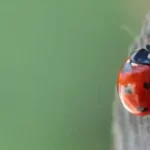Although rabbits may be adorable, particularly when young, they have the potential to cause significant and lasting harm to your vegetable garden. Whether you place a protective fence around your garden or opt for alternative methods, in this article, I’ll share some popular approaches to ensure your plants stay safe throughout the season and how to keep rabbits out of garden.
Employ physical barriers like fences and wire mesh to protect your garden from rabbits. Installing and maintaining these barriers is crucial, as bunnies are notoriously relentless. Alternatively, use natural repellents like garlic or pepper sprays to deter and discourage them.
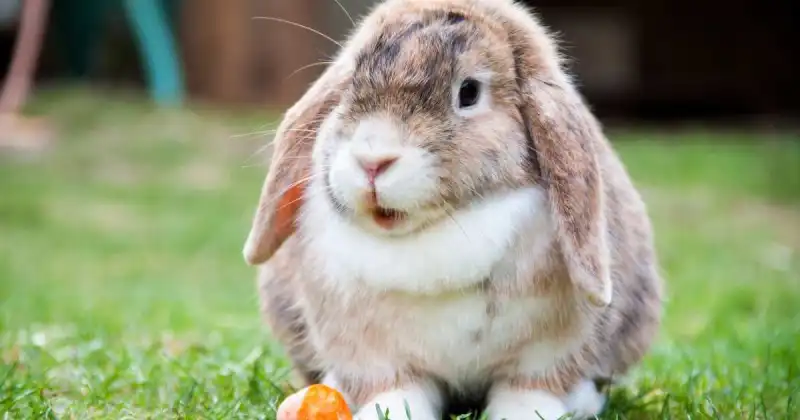
As cute and cuddly as they look, you won’t look at bunnies the same way once they begin raiding your food oasis and damaging your tender plants. You can create a well-protected space by building physical barriers and repellents while adhering to sound garden management techniques.
Although using these strategies and consistently implementing them helps ensure the success and longevity of your veggies while employing natural pest control methods, keeping mischievous rabbits at bay will go a long way in protecting your crops from these pesky critters.
Humble Highlights
- Discover and identify these 5 tell-tale and unique signs rabbits exhibit around your garden so you can prepare the proper treatment quickly to reclaim your green space!
- Save time by knowing what guaranteed factors contribute to bunny infestations and how you can prepare so you can stop feeling helpless to stop feeling helpless.
- Discover the latest innovative strategies and deterrents to prevent rabbits from eating your crops so you can reclaim your garden faster!
Understanding Rabbit Behavior Around The Plants
Rabbits have a remarkable talent for reproducing and a taste for all things green, leaving your garden in the crosshairs. While growers often find these furry rascals drawn to their developing plants, you can identify the presence of rabbits in your garden by looking for these surefire signs.
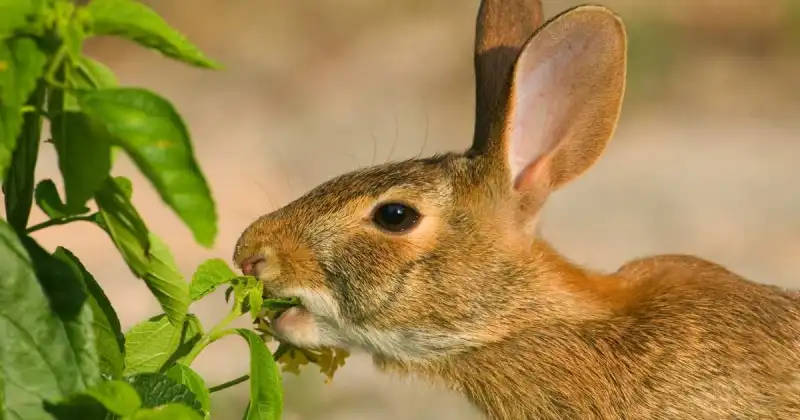
- Check for nibbled plants or crops. Bunny bite marks usually have a unique 45-degree angled bite, which you can easily distinguish from other wildlife.
- Look for tracks. Keep your eyes peeled and take a slow walk about your garden. You might spot their distinctive tracks, which form elongated oval shapes with four toes in front and five in the back.
- Look for pea-sized droppings. Bunnies leave behind small piles of excrement in areas they’ve visited. Typically these piles are easy to spot and identify.
- Watch your young plants. Keep a watchful eye on your young and maturing plants. Bunnies love to feed on their tender foliage, and you’ll notice most will be chomped entirely down to the ground.
- Look at tree bark. Be mindful of nearby trees during spring, as rabbits enjoy chewing their bark. If you notice trees in the area have been affected, it may be a tell-tale sign rabbits are close by. 1
Check Lowest Prices On Garden Pests Books Here
Types Of Rabbits To Keep Out In Your Garden
There are four distinct and common species of rabbits that you’ll likely face in your gardening endeavors, including:
- Cottontail Rabbit
- European Rabbit
- Brush Rabbit
- Snowshoe Hare
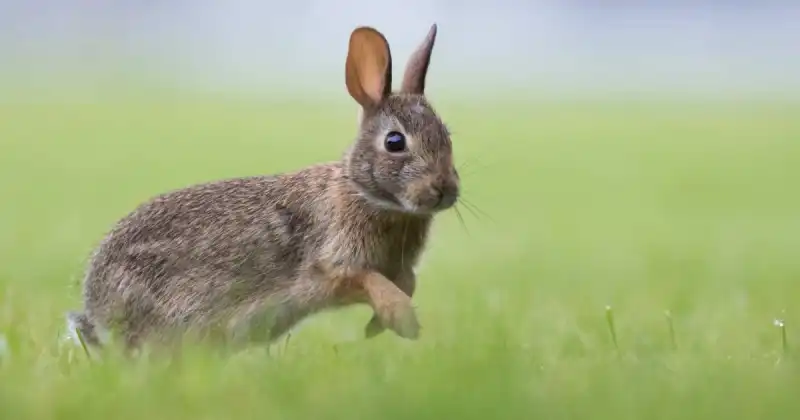
It’s essential to know the kind of rabbit that’s hopping around and munching on your garden foliage. Whether it is a baby bunny going after your tender veggies or an adult reaching for those mature plants, identifying the exact species and size can give you helpful information and makes a big difference in your treatment. So, let’s look closer at the common types of rabbits you might encounter.
Cottontail Rabbit
What makes the Cottontail stand out is its fluffy tail that looks like, well, a puff of cotton. Its fur usually comes in shades of brown or grayish-brown, which helps it blend in with its surrounding environment and stay hidden from other predators. 2
European Rabbit
This rabbit species originally comes from Southern France and Spain but has since traveled to different parts of the world. The European rabbit is famous for digging burrows in the ground and being able to live in all sorts of environments. When you spot this bunny, you’ll notice that it usually has fur in shades of brown or gray.
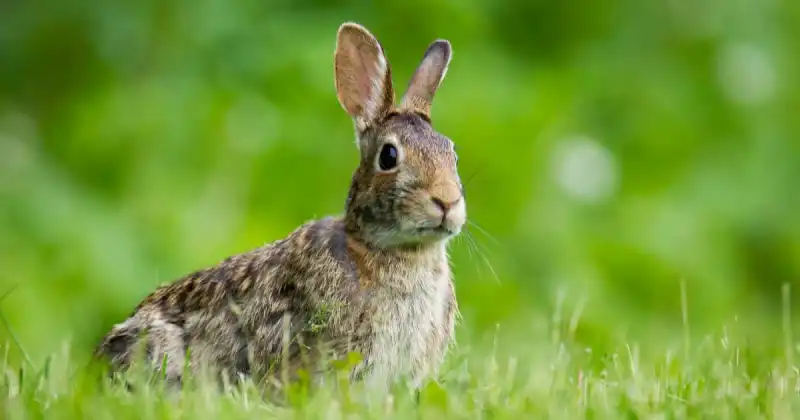
Brush Rabbit
You can often find this species in the western United States, especially in places with thick plants and grass where it can shelter. The Brush rabbit enjoys being in areas with plenty of shrubs and grasses that can provide cover and typically has fur that ranges from brown to grayish-brown.
Snowshoe Hare
Native to northern regions, the Snowshoe Hare is recognized for its distinctive features. It possesses large hind feet that enable it to navigate snowy terrain easily. This resourceful bunny has a cool feature whereby its fur changes colors, providing protection and cover. Its fur turns white in winter, allowing it to hide in the snowy landscape. But when temperatures warm and the snow melts, their coat changes to a brown or grayish-brown color to match the landscape it inhabits.
Factors That Attract Rabbits To Your Garden
Rabbits are attracted to lush and vibrant gardens because they usually incorporate all the elements they enjoy, including food, water, and shelter. Let’s look at each of these primary attractions that bunnies desire.

Abundant Vegetation
If you’re growing a garden, it’s likely only a matter of time before you’ll need to deal with rabbits. From carrots to lettuce, these busy furballs won’t be discriminatory. Although they can feast on your thriving vegetable crops any time, most of their damage likely comes at night when there’s less activity and won’t be bothered.
Water Sources
As a humble gardener, you’ve likely placed your backyard garden near a water source, like an outdoor spigot. And as a prudent grower, you may have established standing water spots throughout your garden to encourage birds and beneficial pollinating insects to visit throughout the day. Rabbits also enjoy these convenient watering holes. Although bird baths will be too high to reach, small bowls of water left in dishes on the ground are another story and may lure rabbits into your green area. 3
Check Lowest Prices On Bird Baths Here
Shelter
Rabbits enjoy shelter. Go figure. These hares are experts at finding cozy hiding spots in and around your garden. Rabbits enjoy dense shrubbery, tall field or ornamental grasses, and overgrown patches and may even nest under sheds or out in the open to have babies, called kittens.
Keep Rabbits Away: Potential Entry Points And Hiding Spots
Identifying potential entry points and hiding spots throughout your garden is crucial in outsmarting these crafty nibblers. Stroll around your area, and be mindful of gaps in fences or walls with holes or openings where they could squeeze through.
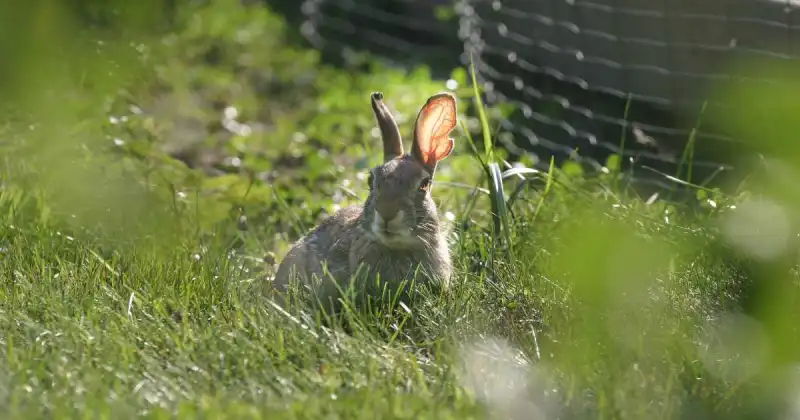
You’ll also want to check for signs of burrowing activity near fences, walls, or garden edges. If bunnies can’t get through your fence, they’ll try to tunnel underneath. If you find any, it’s a surefire sign rabbits have set up shop close by and are within proximity to your garden. Don’t forget to investigate underneath structures like sheds or decks, where these pesky critters might seek shelter and privacy while attempting to avoid detection. 4
Natural Rabbit Repellents: Scents Rabbits Hate
Rabbits have a keen sense of smell, and certain scents are known to repel them. Grow strong-smelling herbs like rosemary, lavender, or mint throughout your vegetable beds or cultivate flowers such as marigolds, geraniums, snapdragons, and strawflowers in pots to deter rabbits.
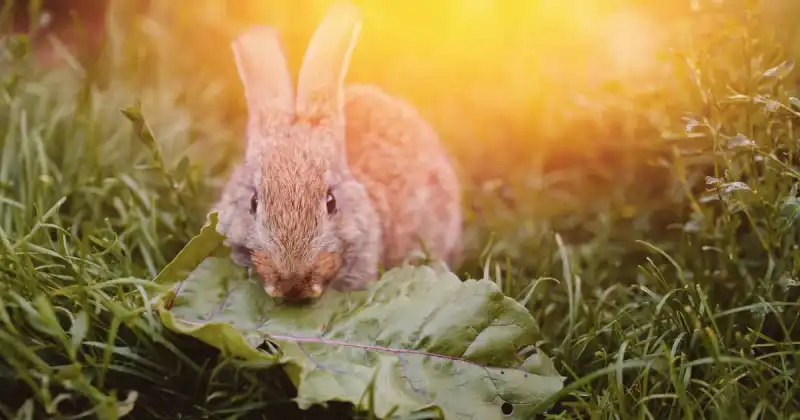
Spraying a mixture of garlic or onion juice diluted with water on vulnerable plants can also discourage bunnies from feasting. Additionally, you can use predator scents like fox urine or coyote urine, which rabbits don’t like, perceive as a threat, and will avoid. 5
Check Lowest Prices On Rabbit Repellents Here
Companion Planting For Rabbit Problems
Companion planting involves strategically placing certain plants together to benefit each other in various ways, including:
- Amending the soil
- Luring harmful insects away from other nearby plants
- Improving the flavor of your maturing vegetables. Rosemary, thyme, and mint make excellent flavor-enhancing choices

Interplanting these rabbit-repellent plants among your vulnerable crops can help deter rabbits from approaching them. Additionally, growing tall, spiky plants like sunflowers can create a natural physical barrier and make it more challenging for rabbits to access the area without a fence. 6
Check Lowest Prices On Companion Planting Books Here
Physical Deterrents For Rabbits: Fences, Raised Garden Beds, Plastic Wire Mesh
There are plenty of obstacles you can place in your garden that help discourage rabbits from visiting, including:
- Fences
- Raised Garden Beds
- Plastic Wire Mesh
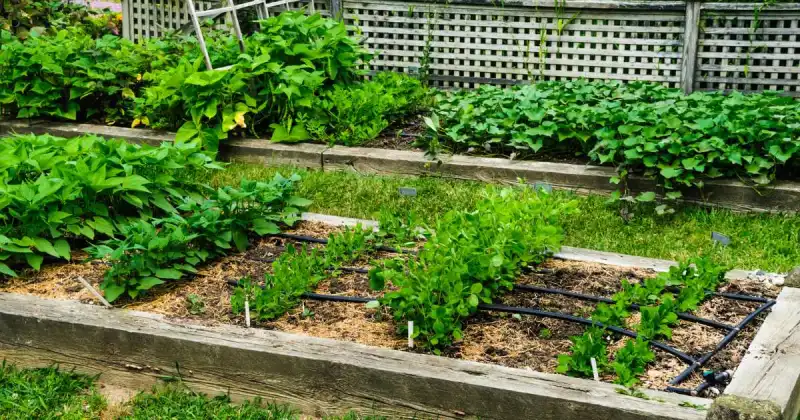
Fencing Strategies To Keep Rabbits Out Of Garden
Installing a fence is one of the most effective and practical ways to keep bunnies out of your garden. Although there are many good selections, you’ll want to choose a sturdy material like chicken wire, hardware cloth, or welded wire mesh with small openings (about 1 inch or less) to prevent rabbits from squeezing through. 7
Check Lowest Prices On Garden Fences Here
Extra Layer Of Protection: Raised Beds
Building raised garden beds can provide an extra layer of protection against rabbits. Construct these beds using materials such as wood or composite boards and ensure they are at least 1 to 2 feet high to keep it more challenging for rabbits to reach the plants.
For additional protection, consider attaching a mesh or wire covering to the sides and bottom of each bed to keep them further out of the garden. Also, consider adding a layer of mulch to your garden using prickly branches, gravel with a rough texture, or even chicken grits, which chickens enjoy pecking at. These options can create an unfriendly and uncomfortable surface for rabbits as they don’t enjoy rough surfaces.
Check Lowest Prices On Raised Garden Beds Here
Plastic Wire Mesh
Plastic wire mesh or netting can be an effective physical barrier to keep rabbits away from specific areas or plants. Selecting durable plastic mesh is preferable with small openings that hares cannot squeeze through.
Install the mesh around vulnerable plants or create temporary fencing around specific sections of your garden you’d like to make more secure. Affix the mesh firmly to posts or stakes to ensure rabbits cannot push through, which they have been known to do if they are hungry enough. Regularly inspect and maintain these deterrents to ensure their effectiveness over time.
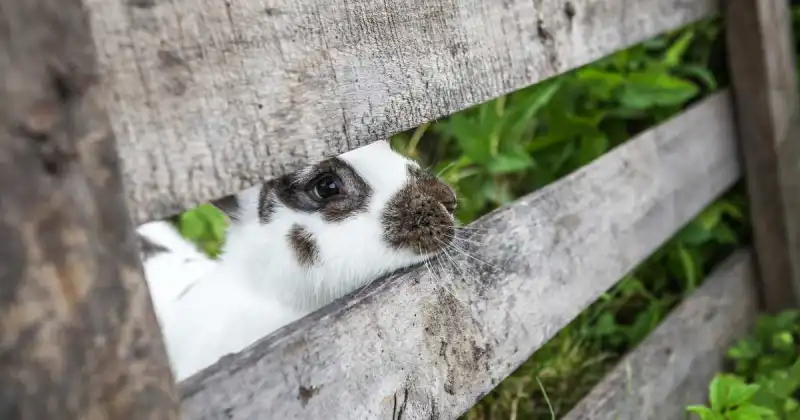
Here’s a fun and educational video explaining some excellent and easy-to-implement tips on how to get those pesky rabbits out of the garden. Remember, what looks attractive in your garden also looks good to these floppy furballs. Be mindful of any readily accessible points of entry and open water sources while addressing any places they may shelter to get a headstart on curbing these challenges.
Other Effective Ways To Keep Rabbits Out Of The Garden: Repellents And Traps
If fences aren’t a choice you’d like to invest in, there are other proven and effective ways to keep rabbits out of your garden, including:
- Homemade And Store-Bought Repellents
- Live Traps For Capture And Relocation
- Pets In the Yard: Dogs And Cats
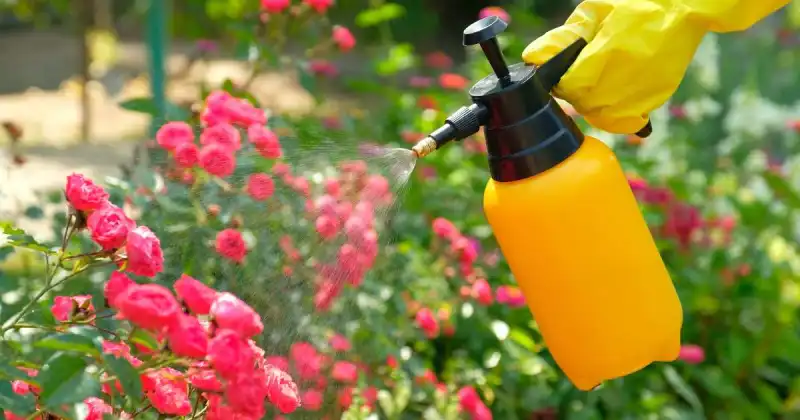
DIY And Store-Bought Repellents
Repellents can be valuable and inexpensive in deterring rabbits from your backyard garden. Homemade repellents often include ingredients like garlic, hot pepper sprays, or strong-smelling herbs that rabbits dislike. Apply 6 hours before anticipated rainfall for best results and reapply after rain. Remember, even without precipitation, repellents will need to be reapplied often to work efficiently.
Check Lowest Prices On Safety Glasses Here
Store-bought repellents are also available, typically containing natural or chemical ingredients designed to repel deer and rabbits. Follow the instructions on the product’s label carefully when applying to ensure its effectiveness, and wear the appropriate safety gear, like gloves, glasses, and a long-sleeve shirt.
Live Traps For Capture And Relocation
Live traps can be a sensible and humane option for capturing rabbits and relocating them to a more suitable environment – and that’s anywhere but your garden. Choose traps specifically designed for rabbits to ensure their safety during capture.
Once caught, it’s crucial to release the rabbits far away from your green space, preferably in an area where they won’t cause harm to other gardens or natural habitats. You’ll want to check state and local regulations and guidelines to ensure you comply with any legal requirements regarding trapping and relocation. 8
Pets In the Yard: Dogs And Cats
Having pets like dogs and cats make rabbits think twice about munching on your foliage. Dogs are natural protectors and have a keen sense of smell and hearing. Their presence alone is a way to keep rabbits away from venturing into your yard. Dogs also have a knack for chasing bunnies and other critters that may threaten your garden. Their territorial instincts and larger size can intimidate and frighten rabbits, making them less likely to approach.
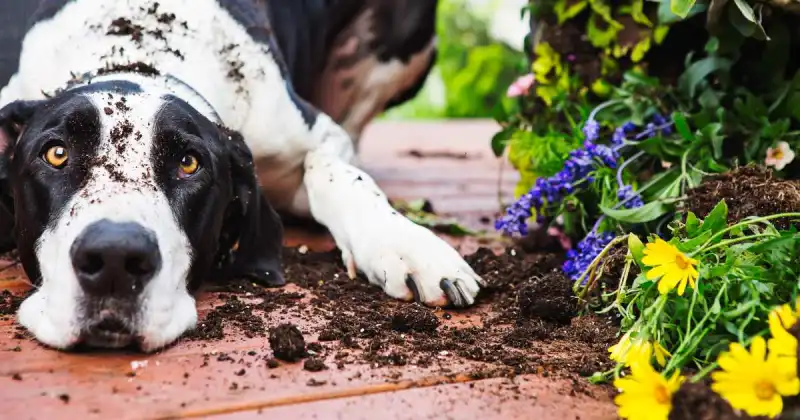
Conversely, cats are natural hunters and excel at catching small rodents, including rabbits. Even if your cat doesn’t directly hunt rabbits, their presence alone can discourage them. The scent and sight of a cat in the yard can signal the area is unsafe, causing rabbits to seek alternative habitats.
Effects Of Rabbits In Your Garden
Rabbits love to eat and can cause plenty of trouble in your garden. They will munch on your vegetables, flowers, and even the bark of young trees. This constant nibbling can seriously harm your plants and landscape, stunting the growth of your foliage or even killing them.
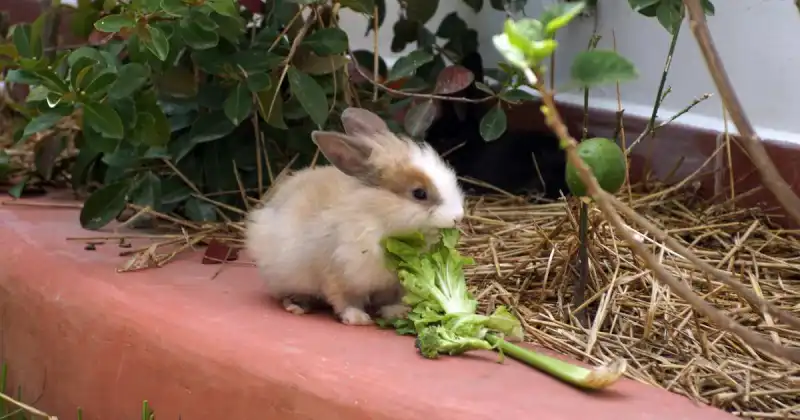
Rabbits also burrow and dig holes, setting up their nests, typically within access to your developing crops. Once these nests are established, your plants’ greenery, soil, and roots may begin to suffer subsequently. Therefore, watching for signs of rabbits and taking immediate and decisive steps is vital to protect your garden from their destructive mischief. 9
Tips To Keep The Bunnies At Bay
Any grower can take several proven steps to keep their garden safe from the harmful damage rabbits can cause. These initiatives include:
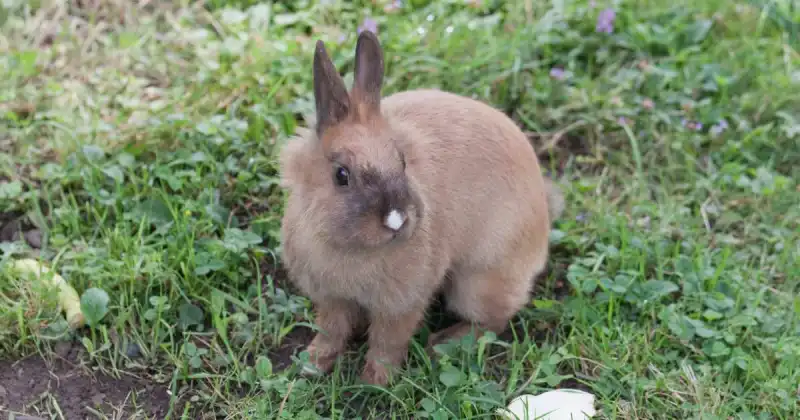
- Building a fence. Fences can be created using materials like chicken wire or hardware cloth with small openings to prevent rabbits from entering. Ensure your fence is buried at least 6 inches into the ground to prevent rabbits from burrowing underneath.
- Apply repellents. Natural or store-bought repellents make excellent and affordable options, such as Repels All Animal Repellent Granules or Deer and Rabbit Repellent Granules.
Check Lowest Prices On Rabbit Repellents Here
- Sow plants bunnies don’t like. Choose plants that rabbits are less likely to nibble on, such as lavender, marigolds, daffodils, and herbs, including oregano, parsley, and mint.
- Construct physical barriers. Options like wire mesh placed around individual plants or vulnerable areas to physically block rabbits’ access may be an effective additional layer of protection.
- Organize your area. Remove debris or overgrown vegetation that could provide ideal hiding spots for rabbits. Keep the garden area clean and well-maintained. 10
Check Lowest Prices On Motion Activated Sprinklers Here
- Let it rain. Set up motion-activated sprinklers or similar devices that make noise to startle rabbits and discourage them from entering your garden.
- Companion planting. Plant strong-smelling herbs or flowers that rabbits hate as a deterrent. For example, rosemary, thyme, and oregano can be effective choices.

Conclusion
We have explored effective strategies to protect your garden from rabbits to ensure the continued flourishing of your cherished and prized plants. Signs of rabbits in your backyard garden include nibbled crops and tree bark, tracks, and pea-sized droppings. However, by understanding rabbit behavior, you can create a harmonious space where marauding bunnies are kept at bay. At the same time, you can continue to enjoy the beauty of nature and the fruitful abundance of your plants.
Because rabbits enjoy all the elements of a well-managed space, including water, abundant food, and shelter, you’ll want to look for potential entry points, apply repellents within and around your garden, and sow plants these critters don’t eat or enjoy smelling.
Additionally, building a fence with small holes, humanely trapping and releasing curious rabbits, and inviting your pets into your garden more often are all excellent alternatives to keeping bunnies away from your prospering plants.
Although rabbits may find it difficult to resist the allure of abundant vegetation, by employing these strategies, you can minimize the impact these furballs may have on your plants and garden soil. Respecting nature and creating a haven where you and your furry friends can coexist harmoniously is essential. So let’s appreciate this relationship by being responsible and respectful.
Have you had a rabbit issue in your garden that you successfully managed with an option I’ve not included in this article? We’d love to know your story. Take a moment and share your experience with your fellow growers below in the comments!
SOURCES
- National Library Of Medicine, National Center For Biotechnology Information – Rabbit Basic Science
- Kansas State University, Research And Extension – Cottontail Rabbits
- Almanac – Rabbits
- Farmers’ Almanac – Tips For Keeping Rabbits Out Of Your Garden
- University Of Florida – Rescue Plants From Rabbits
- Penn State University, Extension – Rabbit-Resistant Garden And Landscape Plants
- Royal Horticultural Society – Rabbits
- University Of California, Agriculture & Natural Resources – Rabbits
- University Of Missouri, Extension – Preventing And Controlling Damage Caused By Cottontail Rabbits
- WildlifeHelp.org – How To Keep Rabbits Away From My Garden, Flowers, And Trees


